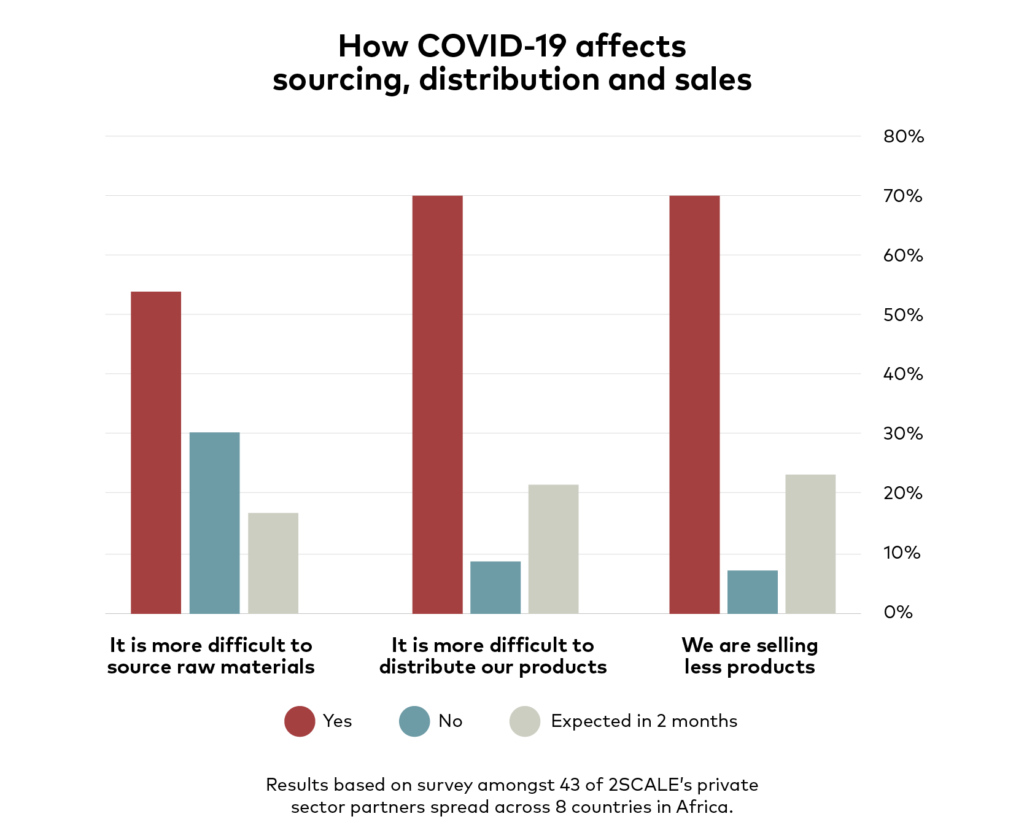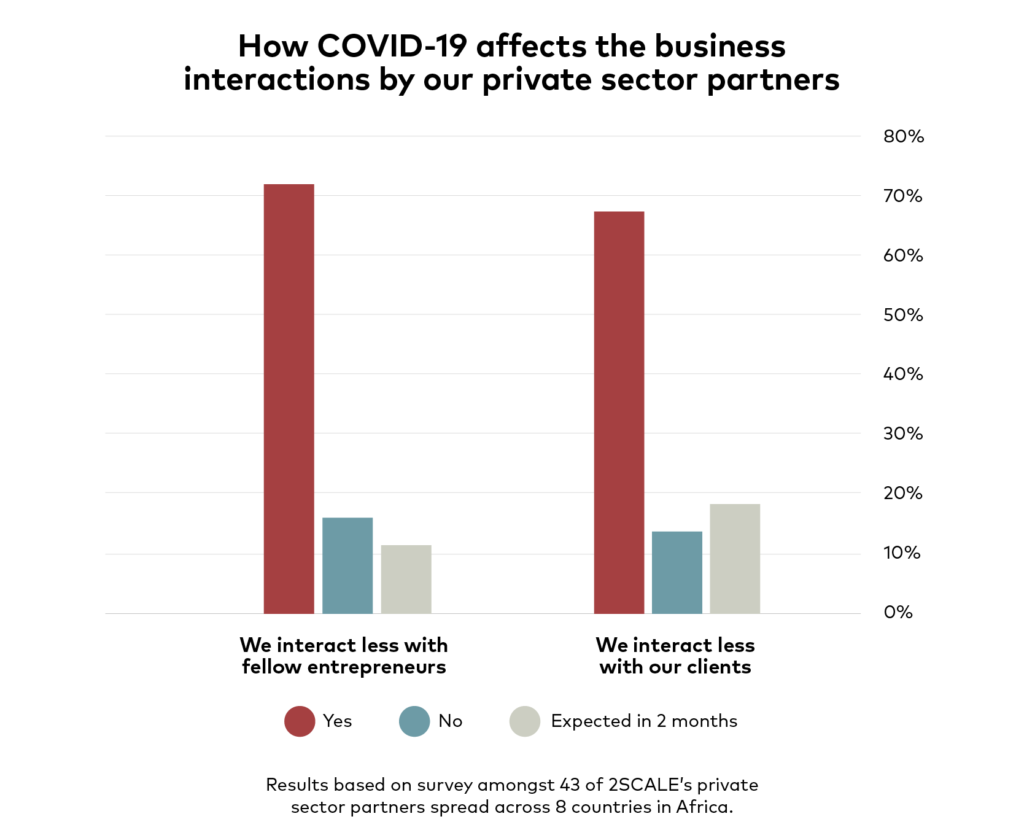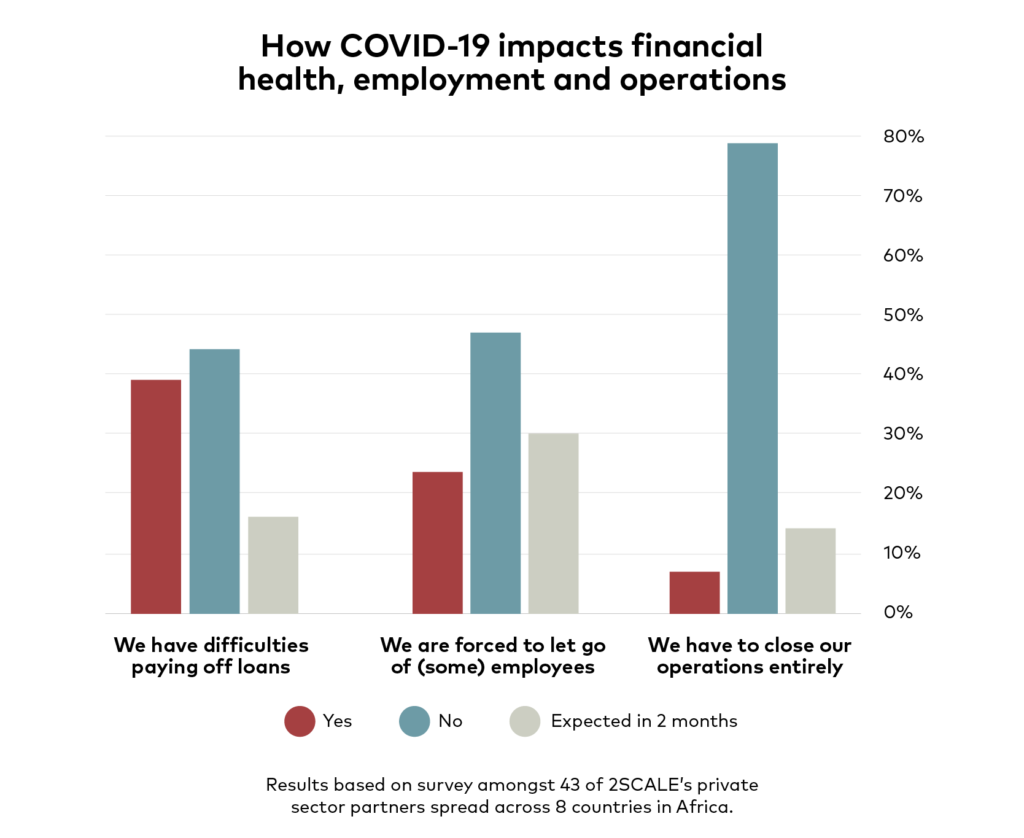
A version of this blog first appeared on 2SCALE.org.
In recent months, the COVID-19 pandemic has troubled the world. Beyond a health crisis, it has also caused an economic crisis. Food systems are also greatly affected, but it is not that easy to understand the details of this. As it is very important for 2SCALE to understand this impact and act upon it, we asked our private sector partners: How do you deal with this pandemic?
The outcomes
A short online questionnaire was set up to understand the impact of COVID-19 on their activities, and the measures they have adopted to deal with it. In this blog, we share with you the main conclusions from this quick survey under which over 40 of our private sector partners from our different program countries responded within a short timeframe.
Working with farmers
Governments in many countries took significant measures to limit propagation of the virus, with restrictions on the movement of goods and people being one of the most impactful measures. Group works, meetings, outreach activities like farmers field training, many of these activities are suspended until further notice. The measure is also making it difficult for farmers to supply companies, and where raw materials are still available, prices have gone up significantly. It is also leading to spoilage on farms and during product transportation:
“Due to the curfew imposed by the government, our farmers, aggregators, and agents are finding it difficult moving raw materials from the farms to our factory” / “overzealous security personnel delay our vehicles, which leads to spoilage.”

This situation requires both SMEs and farmer organizations, as well as individual farmers, to take immediate actions to cope with the effects, which we can see from the following quotes:
“Most of our raw materials are sourced from Kayes, one of the first regions in Mali to have registered cases of COVID-19. Transport is currently limited in the area. The company is transporting the baobab from that region to Bamako on its own; which is more expensive for us.”;
And:
“We have surprisingly witnessed increased demand for inputs and services from farmers. We think this is because they […] want to invest in something that will guarantee them income. We also experience more farmers intending to sell their produce [..] most of them need cash to meet (family) obligations.”

Access to markets
The impacts of COVID-19 at the market level varies from one partner to another. Most companies face a dramatic drop in demand for their products, but a few companies do see an increase in demand for their products, especially for products with a long shelf life. But most companies, especially the ones supplying other businesses or institutional markets, see a dramatic drop in demand for food products:
“We supply school canteens, and with schools closed, our sales are strongly affected; they are also one of few customers who paid us cash, so our cash flow is also heavily affected.”

More direct sales to consumers is also negatively affected, also with companies themselves restricting movement of sales staff to prevent infection. Such was the decision of our dairy partner KDPL in Kenya:
“One of our milk ATM’s has been closed until further notice, while the other milk bars are selling less. To avoid contact between our sales team and potentially contaminated people, we have stopped selling products to individuals and resellers.”
The situation has required the development of innovative approaches to stay in touch with customers and other stakeholders. One of our partners in Mali, has set upWhatsapp groups, aiming to send frequent messages to its customers to drive demand for their new way of servicing customers that is mostly focused on home delivery.
Mitigation measures
The crisis is still at its beginning; and it is not easy for the majority of our partners to develop an elaborate mitigation plan. However, everyone is unanimous on the need to innovate and shift their approach. Among other common answers, partners are planning to deal with the situation by developing digital communication, sales and service provision towards farmers and consumers, diversifying their market approach, allowing for more innovative approaches to distribution that allow for more focused targeting of consumers In addition, there is the need to establish storage facilities for long-term product conservation; and the need to request government to minimize the effect of the restrictions on food transportation, and ask financial institutions to soften the conditions on loans to farmers and SMEs. Niek van Dijk, 2SCALE program manager, reflects on the outcomes:
“What surprises me, is that even though most companies see their core processes (sales, distribution, sourcing) being heavily affected by the crisis, they seem much less concerned about the continuity of their business; for their staff, their financial position as well as the overall continuity. It’s difficult to tell whether this should be a reason for concern, or whether it is justified optimism.”

Next steps
As one of the first, bigger steps to address COVID-19, 2SCALE is partnering up with other major (Dutch funded) food security programs and the Dutch government to come up with joint approaches to contribute to mitigating the effects of COVID-19. The huge challenge the pandemic is posing, requires a joint response, where all partners contribute based on their strengths.
“The call for digitization is clear. But most partners don’t seem to be ready to go digital, beyond basic approaches such as using Whatsapp. 2SCALE could play an important role in supporting the companies with more elaborate approaches to digitization, which could also help the companies run their businesses more effective post-COVID-19”
Niek van Dijk, 2SCALE program manager
More information about the joint approaches will be shared on our social media channels.




